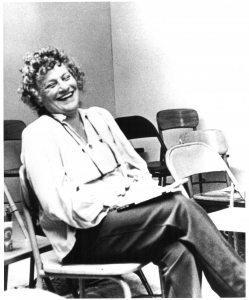Recently, I attended a master class by Impro creator Keith Johnstone. It was very interesting to watch how he conducted scenes with beginners and some of his wonderfully talented master students. I watched as he constantly stopped players from the outset when they made a choice that wouldn’t work. I was also interested in how he coached. He didn’t coach as much as he directed and lectured. He had ideas he wanted to demonstrate and it did lead to interesting work. As I sat there watching him make choices for his students, I hearkened back to my early student days with Viola Spolin.
It’s been a long while since I was in Viola’s class, but her words, actions, temperament and wisdom have stayed with me ever since.

Courtesy of Andrew Harmon
I’d like to discuss an aspect of teaching the games I’ve not touched on before: That of stopping a scene that isn’t working.
Now this does not mean she called “Freeze!” and redirected the scene. Or stewed as the scene fizzled. She would set up a game, give us the focus, state the rules and tell us to come up with a Who, a What and a Where.
I bring this up, because I’ve watched some teachers struggle to coach successfully. They often allow a scene to go on too long, in the wrong direction or watch in dismay and judgmentally let students suffer through. I’ve also watched a lot of teachers not use side-coaching properly and simply wait to give notes on ‘what you could have done’. That does not serve the players well.
Sidecoaching is an assist to get something to happen while it’s going on. A word or phrase or new focus that might lift the scene and the players out of the head and into the space and create that spontaneous spark that propels us into the unknown.
I would like to add that, in my opinion, Improvisation as it is played now, has missed the point many times and gone in search of a funny, well delivered sketch verses a step into the unknown for both player and audience.
Back to Viola’s classroom.
Sometimes we would start a scene and within minutes, she’d get up and say “I have to stop you.”
The reasons were varied, but mostly it was because our choice was not appropriate to the game, or we misunderstood the focus or we were just plain ‘in our heads’.
Sometimes she would just holler “STOP!!” “What on earth do you think you are DOING?!” Other times she’d very nicely say. “I’m going to stop you. What do you think you’re doing?” or “Why did you pick this?” or “This isn’t going to work.”
She’d restate the rules, explain the focus and say ‘start again’ without further explanation. She would never tell us how she wanted a scene to go, but she’d let us know our choices were ones that would put us in our heads, trap us in a story, show her we were playing stereotypes, or play writing.
I also want to say, that sometimes she’d let the scene go on when it wasn’t working and try different sidecoaches to get something to happen. I’d sit next to her and she’d call “Slow-Motion!” or “No Urgency!” or “Avoid questions!”* and sometimes that would not help. She’d turn to me and say ‘That didn’t do it.” or “Well, that didn’t penetrate” when the sidecoach went unheeded. She’d call out another and another suggestion. Heighten that! Explore that! or Share your voice or Stage Whisper – anything that might help the actors find each other, themselves and the space in better relation.
But sometimes she would just holler. “STOP!”
I knew she wanted a certain result, but not in the sense that she know how a scene should go, but if she saw you had no hope of making something happen because you picked a joke to start with or a clever premise that had too many story traps in it she’d burst out with “NO!!!”
She was training us to pick things that would work with a particular focus. She was also showing us that our cleverness was a trap, our acting was premeditated and our focus was on ourselves (head) rather than the space and fellow player.
I think it is a disservice for a coach or director to shoot for a result and guide players in a direction by calling “Freeze! New Idea!” Firstly freeze is a shutting down of the player and “New Idea” is just a call for a cleverer choice. That only makes sense if you want to encourage more original writing and not connection.
Through contact with each other and the where will you find that will-o-the-wisp, Improvisation. True, transformative, unexplored areas. That’s what we’re after, not cute and funny scenes.
If you see that’s what your players are doing or you are in the audience of such a show, holler “STOP!!!”
*Many people quoted Viola as saying “No questions.” but she would always use the word “Avoid questions.” thereby making it your responsibility and not the teacher’s. Small side note, but I think an important distinction.
